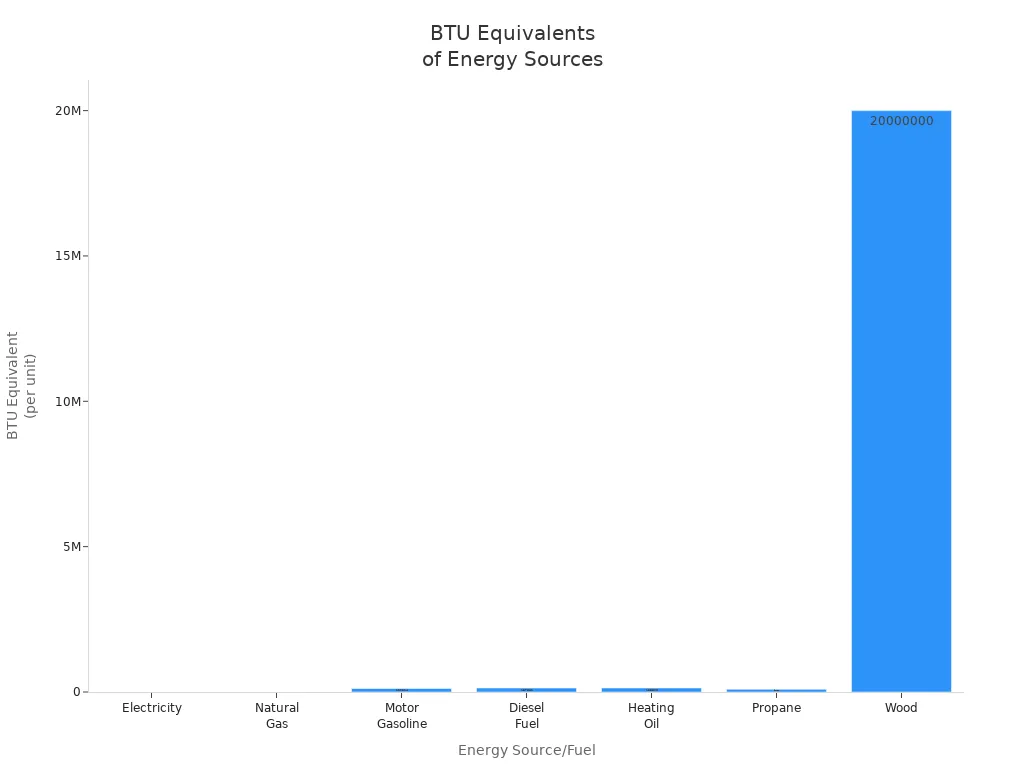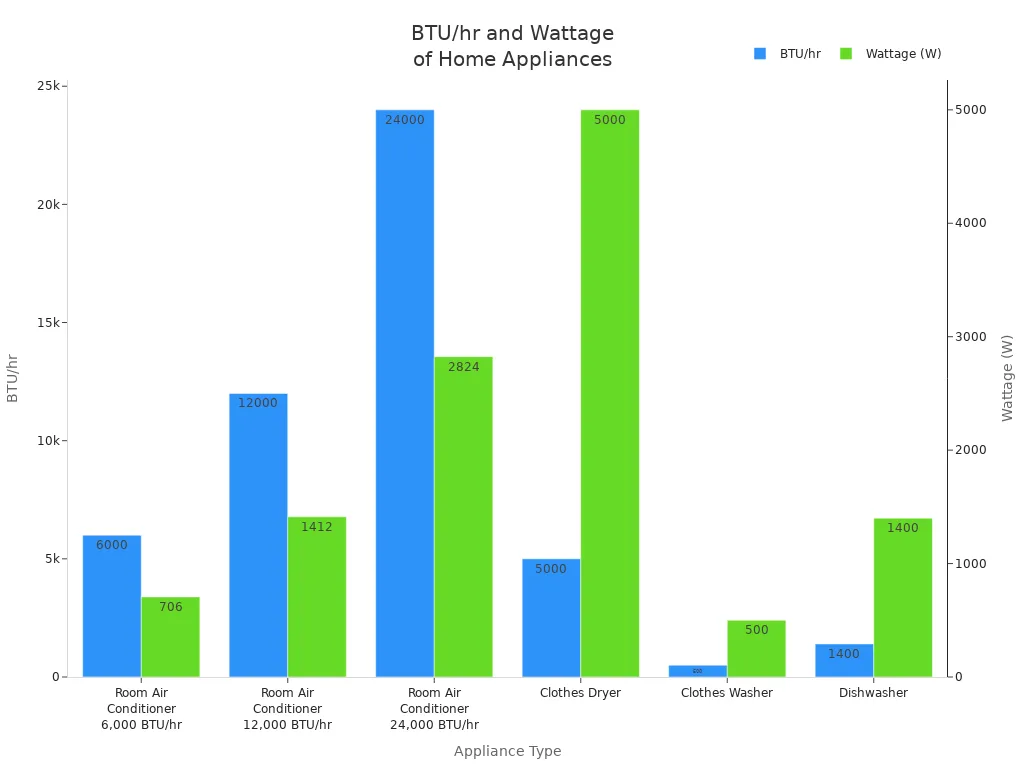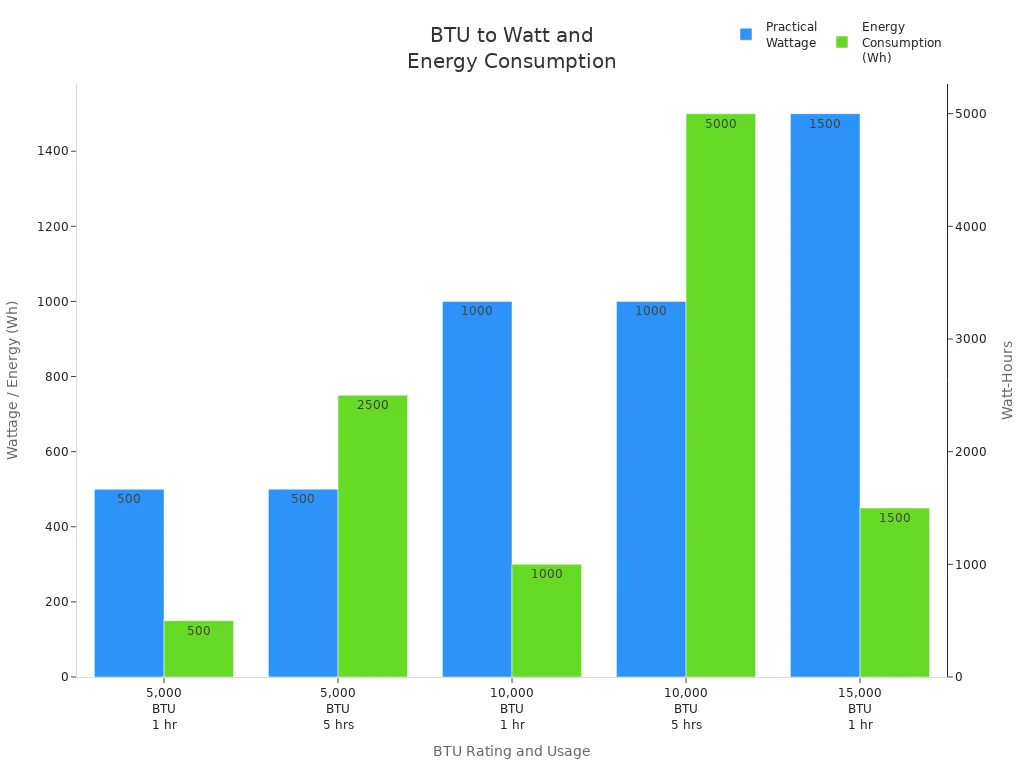+86 17727759177
inbox@terli.net
- All
- Product Name
- Product Keyword
- Product Model
- Product Summary
- Product Description
- Multi Field Search
Views: 0 Author: Site Editor Publish Time: 2025-07-31 Origin: Site
If you want to compare heating or cooling devices for your home, understanding the BTU to watts conversion is essential. The standard formula for BTU to watts conversion is straightforward:
| Conversion | Formula |
|---|---|
| BTU to Watts | Watts = BTU/s × 1055.06 |
For instance, if an electric heater produces 1 BTU per second, it converts to approximately 1055 watts. Many home appliances list power in either BTU or watts, so using this BTU to watts conversion helps you select the right size and better understand energy consumption.

BTU shows how much heat energy there is. Watts show how fast energy is used or made. To change BTU per hour to watts, multiply the BTU number by 0.293. This makes it easy to compare heaters and coolers. Using the right BTU and watt numbers helps you choose the best appliances for your home. This can help you save energy and money. Knowing how to change BTU to watts helps you guess energy costs. It also helps you plan for good heating and cooling. For big systems, change BTU to kilowatts. This helps with large numbers and smart energy choices.

Image Source: unsplash
You see BTU on many heaters and air conditioners. BTU means British Thermal Unit. One british thermal unit is the heat needed to make one pound of water warmer by one degree Fahrenheit. This happens at the same pressure. BTU is a way to measure heat energy. In the U.S., people use BTU to compare fuel energy or to pick the right size for heating and cooling systems at home.
BTU is not a big unit, but it matters when you talk about lots of energy. For example, heating oil, natural gas, and electricity all show their energy in BTU. The table below lets you see how different fuels match up using BTU:
| Energy Source/Fuel | Physical Unit | Approximate BTU Equivalent |
|---|---|---|
| Electricity | 1 kilowatt-hour | 3,412 BTU |
| Natural Gas | 1 cubic foot | 1,036 BTU |
| Motor Gasoline | 1 gallon | 120,214 BTU |
| Diesel Fuel | 1 gallon | 137,381 BTU |
| Heating Oil | 1 gallon | 138,500 BTU |
| Propane | 1 gallon | 91,452 BTU |
| Wood | 1 cord | 20,000,000 BTU |
Note: The "British" in british thermal units comes from its start in the Industrial Revolution. Today, BTU is mostly used in the U.S. Other countries use joules or calories instead.

You also find watts on lots of appliances. A watt is the main unit for power in the International System of Units. It tells you how fast energy is used or made. One watt is the same as one joule each second. If you turn on a 60-watt lightbulb, it uses energy at 60 watts every second.
Watts and BTU are connected, but they are not the same. BTU shows the total energy. Watt shows how quickly you use or make that energy. For example, a heater with 1,000 watts uses energy faster than a 500-watt heater. You can change BTU into watts. One BTU is about 1,055 joules. One BTU per hour is about 0.293 watts.
You use watts to see how much power an appliance needs or gives. BTU helps you know the total heat energy. Both units help you make good choices about heating, cooling, and energy use at home.
You often see BTU ratings on air conditioners, heaters, and other home appliances. When you want to compare these devices or estimate energy costs, you need to convert BTU to watts. This helps you understand how much power an appliance uses or how much heat it can provide.
Many homeowners use btu to watts conversion in these situations:
You shop for HVAC systems like air conditioners or heaters and want to compare their power use and heating or cooling capacity.
You size an air conditioner based on the square footage of your room and want to avoid buying a unit that is too big or too small.
You estimate energy costs and calculate electricity use for your appliances.
You talk with technicians about your HVAC system and want to use the right terms.
You consider solar power solutions to offset your HVAC energy use and lower your electric bills.
If you use the wrong size appliance, you may waste energy and money. Understanding btu output and converting btu to watts helps you make better choices for comfort and efficiency.
You can convert btu to watts easily by following these steps:
Find the BTU per hour (BTU/h) value for your appliance. You can check the label or manual.
Use the conversion factor: 1 BTU/h equals about 0.29307107 watts.
Multiply the BTU/h value by 0.29307107 to get the power in watts.
Round the result to the nearest whole number if needed.
Use this watt value to compare appliances or estimate energy use.
Tip: You can use a btu calculator online for quick conversions. Many reliable tools, like CreativeBooster and Calculator.net, use the standard formula for btu to watts conversion.
The formula for btu to watts conversion is:
Watts = BTU/hr × 0.29307107
This formula comes from the relationship between BTU and joules. One BTU is about 1,055 joules. Since one watt is one joule per second, and there are 3,600 seconds in an hour, you get the conversion factor 0.29307107. This means that if you know the btu output per hour, you can quickly find the watt value.
| Unit Conversion | Value |
|---|---|
| 1 BTU/s to watts | 1055.1 W |
| 1 BTU/h into watts | 0.29307107 W |
Suppose you have a window air conditioner with a btu output of 6,000 BTU/h. To convert btu to watts:
Write down the BTU/h value: 6,000.
Multiply by the conversion factor:
6,000 × 0.29307107 = 1,758.43 watts.
So, this air conditioner has a cooling capacity of about 1,758 watts. However, the actual power it uses may be lower because air conditioners often remove more heat than the electricity they consume. For example, a 6,000 BTU/h air conditioner might use only about 621 watts of electricity, thanks to its efficiency.
| Parameter | Value | Explanation |
|---|---|---|
| BTU rating | 6,000 BTU | Cooling capacity of the air conditioner |
| Direct conversion factor | 0.29307107 | 1 BTU/h equals about 0.29307107 watts |
| Converted watts | 1,758 W | 6,000 BTU × 0.29307107 = 1,758 watts |
| Actual power input | 621 W | Based on voltage and current (115 V × 5.4 A) |
| Cooling watts | 560 W | Power used for cooling (from specs) |
Note: The btu to watts conversion shows the cooling or heating output, not the actual electricity use. Always check the appliance label for real power consumption.
You can use this method for any appliance with a BTU rating. This helps you compare devices, estimate energy costs, and choose the right size for your home.
You can use a chart to quickly see how BTU/hr values match up with watts for common home appliances. This helps you compare devices and plan your energy use. The chart below shows typical ratings for air conditioners, hvac systems, and other household appliances.
| Appliance Type | BTU/hr Rating | Typical Wattage (W) | Estimated Cost per Hour |
|---|---|---|---|
| Room Air Conditioner | 6,000 | 706 | 6¢ per hour |
| Room Air Conditioner | 12,000 | 1,412 | 14¢ per hour |
| Room Air Conditioner | 24,000 | 2,824 | 28¢ per hour |
| Clothes Dryer | 5,000 | 1,465 | 50¢ per hour |
| Dishwasher | 1,400 | 410 | 14¢ per hour |
You can also see the comparison in this chart:

Note: These numbers show the output or capacity, not always the exact electricity used. Real energy use depends on efficiency and how you use the appliance.
You often see BTU ratings on air conditioners and hvac systems. For example, a window air conditioner might have a 10,000 BTU/hr rating. If you want to know how much power it uses, you can convert btu to watts. Multiply 10,000 by 0.293 to get about 2,930 watts. This tells you the cooling capacity. The actual electricity use may be lower because air conditioning units often remove more heat than the power they draw.
Heaters work in a similar way. An electric heater might use 1,500 watts. To find the heating capacity in BTU, multiply 1,500 by 3.41. You get about 5,115 BTU. This helps you compare heating and air conditioning units in your hvac system.
You need to remember that different appliances have different efficiencies. Air conditioners and hvac systems often use less electricity for cooling than heaters do for heating. For example, a 1,500 watt heater warms a small room, but an air conditioner cooling the same space might use only 500 watts. This happens because cooling and heating work differently in hvac systems.
Tip: Use these practical examples of btu to watt conversion when you shop for new air conditioners or plan upgrades to your hvac system. This helps you pick the right size and save on energy costs.
When you buy new appliances, you see different units on labels. Some show BTU, and others show watts. This can make it confusing to compare them. If you change BTU to watts, you can compare how much heat or cool each system gives. This helps you pick the right size for your room. You will not get a unit that is too big or too small.
If you pick a hvac unit that is too big, you waste energy and money. If it is too small, your home will not feel comfortable. Changing BTU to watts helps you find the best fit. You can talk to technicians using the right words. You can also make better choices for your heating, cooling, and air systems. This also helps you plan for upgrades, like adding central heating or getting better hvac equipment.
Knowing how to change BTU to watts helps with energy checks. It also helps you think about green choices, like solar power. You can control your heating and cooling better and manage your electric bills.
| Aspect | Explanation |
|---|---|
| HVAC Sizing Impact | Right BTU size stops you from picking a unit that is too big or too small. This saves energy and keeps you comfy. |
| Energy Efficiency | The right BTU rating keeps your home at a steady temperature. This lowers energy use and costs. |
| Comfort | The right BTU gives even air and keeps your home at the same temperature. |
Knowing how much power your heating and cooling use helps you control your energy costs. Your electric bill uses kilowatt-hours. So, you need to know how many watts your hvac system uses. When you change BTU to watts, you can guess how much it costs to run your heating and cooling each day or month.
For example, if your air conditioner uses about 2,345 watts and runs for 8 hours, you can find the daily cost:
Energy Cost = (2.345 kW) × 8 hours × $0.23 = $4.32 per day
This easy formula shows how your appliance choices affect your budget. You can use this for any heater or cooler in your house. When you know these numbers, you can decide when to run your central heating or how to save energy during busy times.
Tip: Changing BTU to watts shows you how much energy you use. This helps you plan upgrades, set a budget, and pick good hvac systems for your home.
When you want to convert btu to kw, you use a simple formula. This helps you understand the heating or cooling power of large appliances. Kilowatts (kW) make it easier to work with big numbers, especially for HVAC systems.
Here is a table that shows the formulas and examples:
| Conversion Type | Formula | Example Conversion |
|---|---|---|
| BTU/hr to kilowatts | kW = BTU/hr ÷ 3412.142 | 20,000 BTU/hr ÷ 3412.142 = 5.861 kW |
| BTU/hr to kilowatts | kW = BTU/hr × 0.00029307107 | 10,000 BTU/hr × 0.00029307107 = 2.930 kW |
| Sample Values | 1 BTU/hr = 0.000293071 kW | 1,000 BTU/hr = 0.293071 kW |
To convert btu to kw, you can use either formula. Both give you the same answer. For example, if your heater has a rating of 10,000 BTU/hr, you multiply by 0.00029307107. You get about 2.93 kW. This makes it easy to compare different systems.
Tip: Use kilowatts when you want to see the power of large appliances. This helps you plan for your home's energy needs.
You should convert btu to kw when you deal with large heating or cooling systems. Kilowatts are better than watts for big numbers. If you use watts, the numbers get too large and hard to read. HVAC systems, like central air conditioners and heat pumps, often show their output in kilowatts.
You also use kilowatts when you talk about the total output power of a system. For example, engineers and installers use kilowatts to size equipment for homes and buildings. This makes it easier to compare different brands and models. When you convert btu to kw, you get a clear idea of how much energy your system can deliver.
Watts work best for small appliances, like fans or small heaters. For big systems, always convert btu to kw. This keeps your calculations simple and helps you make smart choices for your home.
You can convert BTU to watts easily by following these steps:
Learn the difference between BTU and watts.
Use the conversion factor: 1 BTU ≈ 0.293071 watts.
Apply the formula: Watts = BTUs × 0.293071.
Check your calculation with real appliance examples.
Think about efficiency and energy costs for your home.
Understanding this process helps you pick the right appliances and manage energy use.
You can use charts, formulas, and online tools to make smart choices.
For best results, consider an energy audit or talk to an expert.

You can multiply the BTU per hour value by 0.293. For example, 10,000 BTU/h × 0.293 = 2,930 watts. This quick method helps you compare appliances fast.
Manufacturers use BTU for heating and cooling devices. You see watts on most electrical appliances. Both units measure energy, but BTU shows heat output, while watts show power use.
No, the conversion shows the heating or cooling output. To find electricity cost, check the actual wattage used by the appliance. Then, multiply by hours used and your electricity rate.
Yes, you can use the BTU to watts formula for both gas and electric appliances. Always check the label for BTU/h, then multiply by 0.293 to get watts.